In my own country I am in a far-off land
I am strong but have no force or power
I win all yet remain a loser
At break of day I say goodnight
When I lie down I have a great fear
Of falling.– Ballade du concours de Blois by François Villon
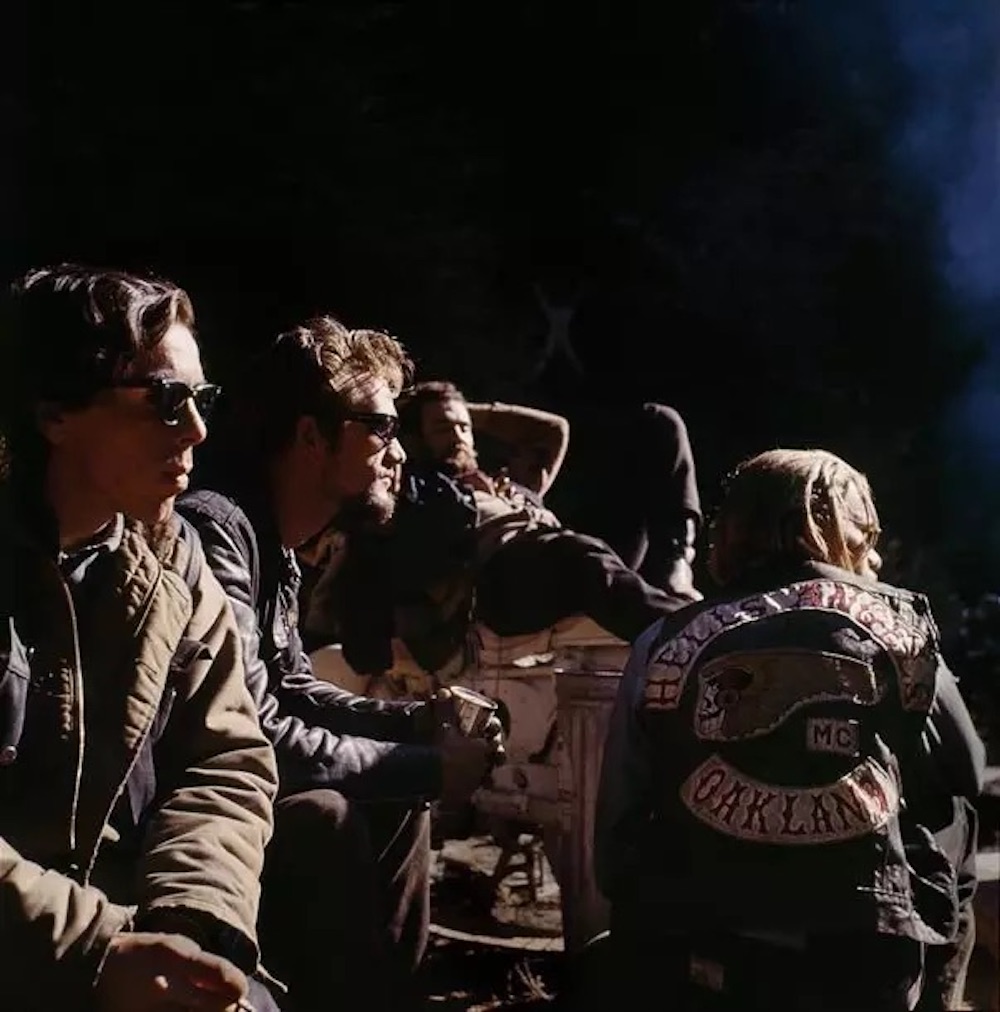
Hunter S. Thompson (July 18, 1937 – February 20, 2005) wrote Hell’s Angels: A Strange and Terrible Saga (The Strange and Terrible Saga of the Outlaw Motorcycle Gangs) in the mid-1960s after spending a year living with the biker gang in California, in particular the San Francisco and Oakland chapters of the club and their president Ralph “Sonny” Barger (October 8, 1938 – June 29, 2022), whom Thompson referred to as “the Maximum Leader”.
To the New York Times, Thompson had embarked on an assignment to show us “a world most of us would never dare encounter”.
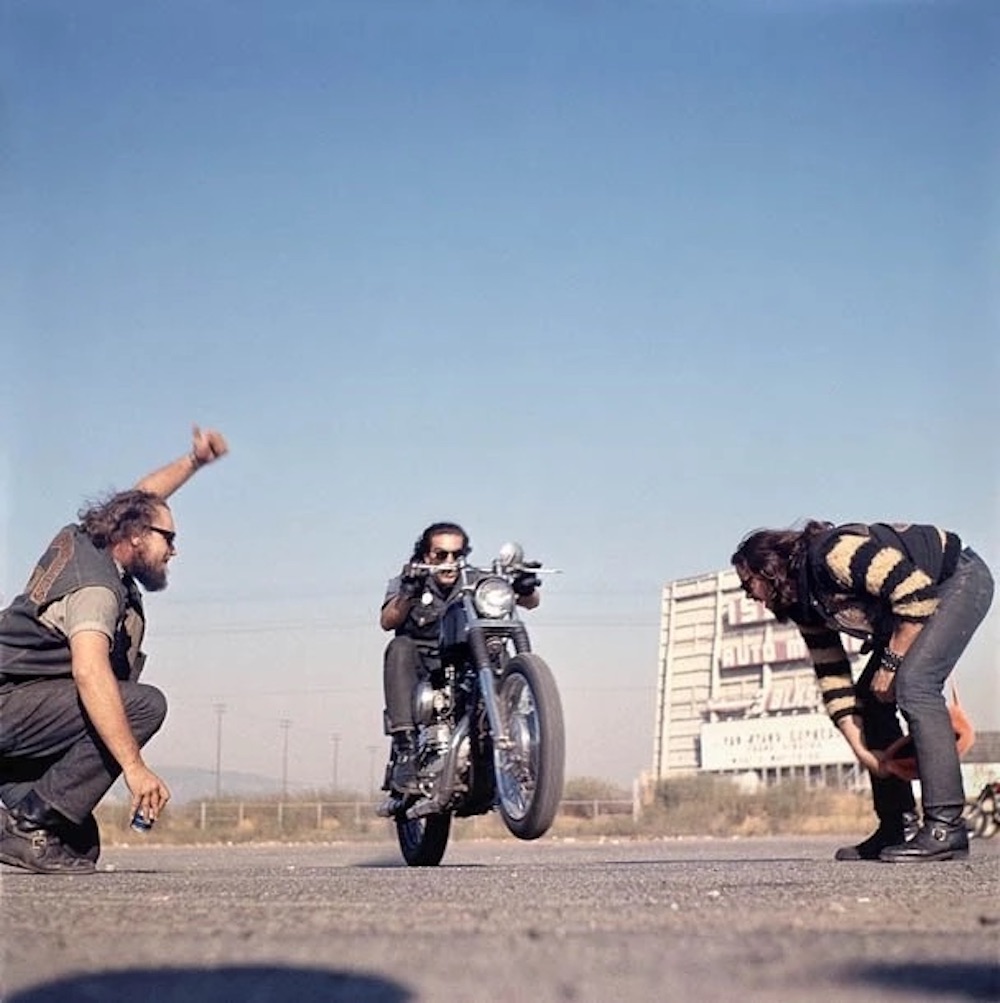
Such was his dedication to the job that Thompson noted: “I was no longer sure whether I was doing research on the Hell’s Angels or being slowly absorbed by them.”
Not everyone was convinced of his authenticity, with Barger saying of the writer: “When he tried to act tough with us, no matter what happened, Hunter Thompson got scared. I ended up not liking him at all, a tall skinny, typical hillbilly from Kentucky. He was a total fake.”
A fake what? Thompson and his ‘gonzo’ journalism contrived to put him always at the centre of the action and celebrate his decadence in a fluid twilight zone between fact and fiction. As one obituary said of him:
If the quotes he had to hand were boring, he made up new ones; if the setting lacked somewhat in vividness, that, too, could be fixed. Fantasies were every bit as useful a foundation for his articles as any sober fetish with “the facts”. He broke every rule in the book, and was crowned in the New York Times as “our official crazy”.
The Book
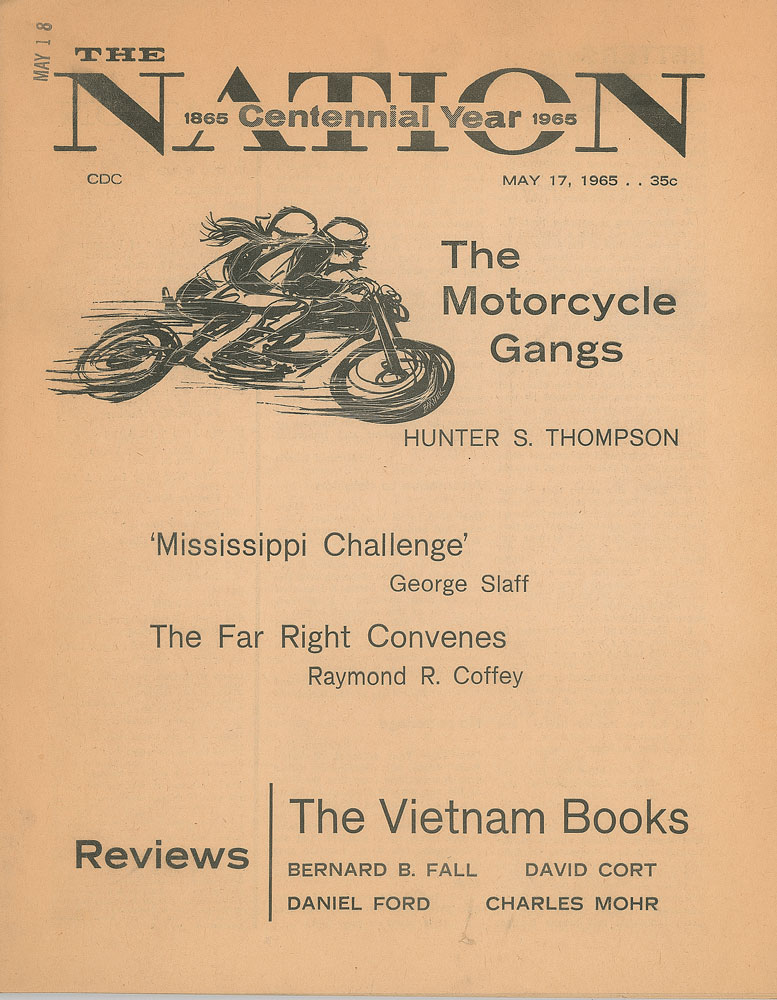
Hell’s Angels was Thompson’s first published book and his first attempt at a nonfiction novel. It started out as the article “The Motorcycle Gangs: Losers and Outsiders” for the May 17, 1965 issue of The Nation, the writer having been introduced to the gang by Birney Jarvis, a former club member and then police-beat reporter for the San Francisco Chronicle.
After receiving the initial commission, Thompson wrote in a letter to his childhood friend Paul Semonin: “the awful shadow of the book – not even begun as yet – hangs on me like a pending shitrain”. Although, the money was good, and the job matched his ambition:
“$6,000 guarantee against royalties for a paperback on Cycle gangs … Incredible. I’ve been drunk for two weeks…
I warn you that you are going to find me a much tougher and shittier person than the one you left in Louisville 2 years ago … It has finally come home to me that I am not going to be either the Fitzgerald or the Hemingway of this generation … I am going to be the Thompson of this generation, and that makes me more nervous than anything else I can think of.”
Thompson Takes A Beating
Thompson moved into an apartment at 318 Parnassus Avenue, San Francisco. The bikers would often come over to talk on the record and review early drafts. Thompson, however, felt comfortable with the arrangement. When “jokingly” threatened with violence, he pointed to a loaded double-barrelled shotgun that he kept hanging on his wall and replied in a similar vein that he would “croak two of them first”.
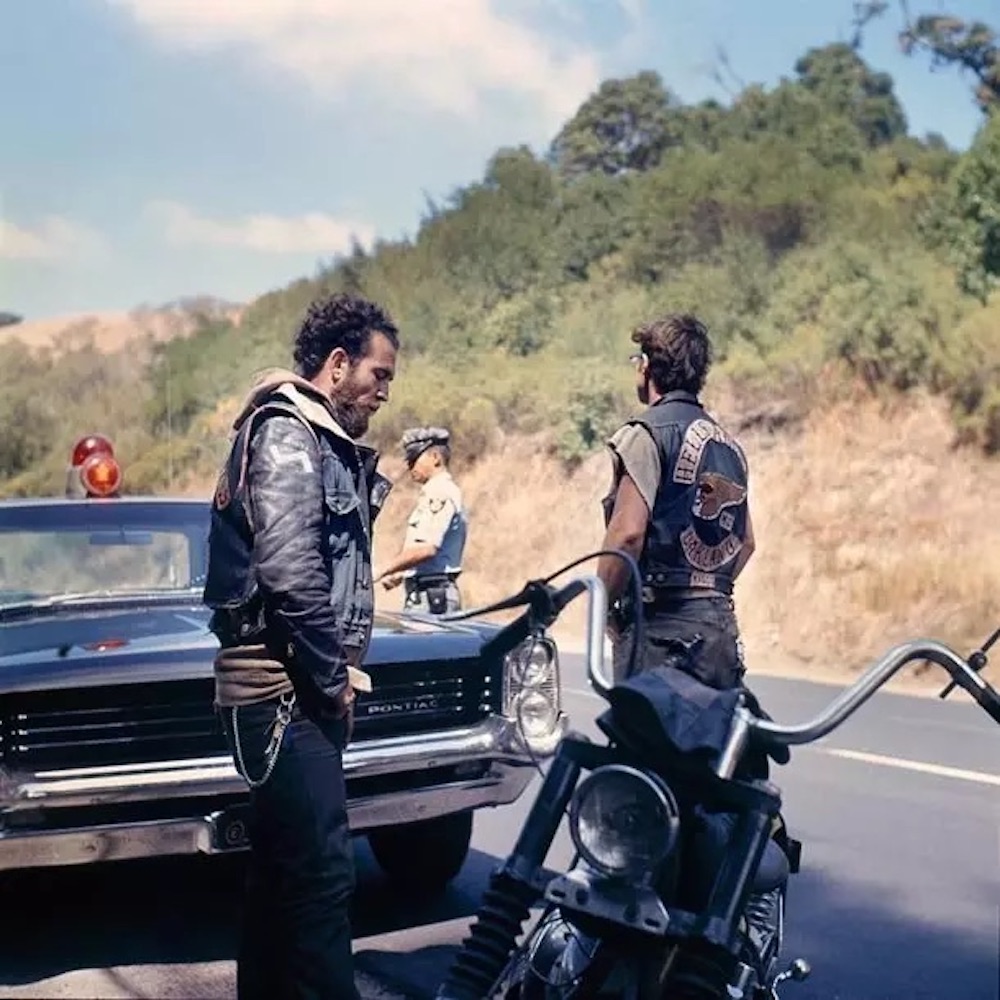
Thompson would later be the victim on a savage beating or “stomping” over a remark he’d made to an Angel named Junkie George, who was beating his wife. Thompson said: “Only a punk beats his wife and dog.” In a later letter, he told Semonin:
“Just coming back from a six-day flip on the bike – booze, drugs, no mufflers, burglary, the works … trying to stay alive … I think maybe I am about to be snuffed…
“Pills, 24 hr-writing, no sleep, packing, fear, etc … Am badly beaten here – the Angels turned on me.”
Thompson mentioned the beating again shortly after the release of his book in an interview with Studs Terkel on WFMT-FM in Chicago (via):
“Well they have a rule: it’s bylaw either number 10 or 11. It says, “When an Angel punches a non-Angel all other Angels will participate.” So I was a victim of bylaw number 10 or 11. I should have known that, it’s a lapse of caution. All during this stomping I could see the guy who had originally teed off on me that just out of nowhere with no warning circling around with a rock about… must have weighed about 20 pounds, I tried to keep my eyes on him because I didn’t want to have my skull fractured.”
In the video below, Thomson meets a Hell’s Angel and gets called out on what happened:
Thompson noted in letters to friends and Sonny Barger that the members who had participated in the beating had not been those with whom he had most closely associated. He continued being fond of Barger, writing in his 1971 book Fear and Loathing in Las Vegas: “Sonny Barger never quite got the hang of it, but he’ll never know how close he was to a king-hell breakthrough.”
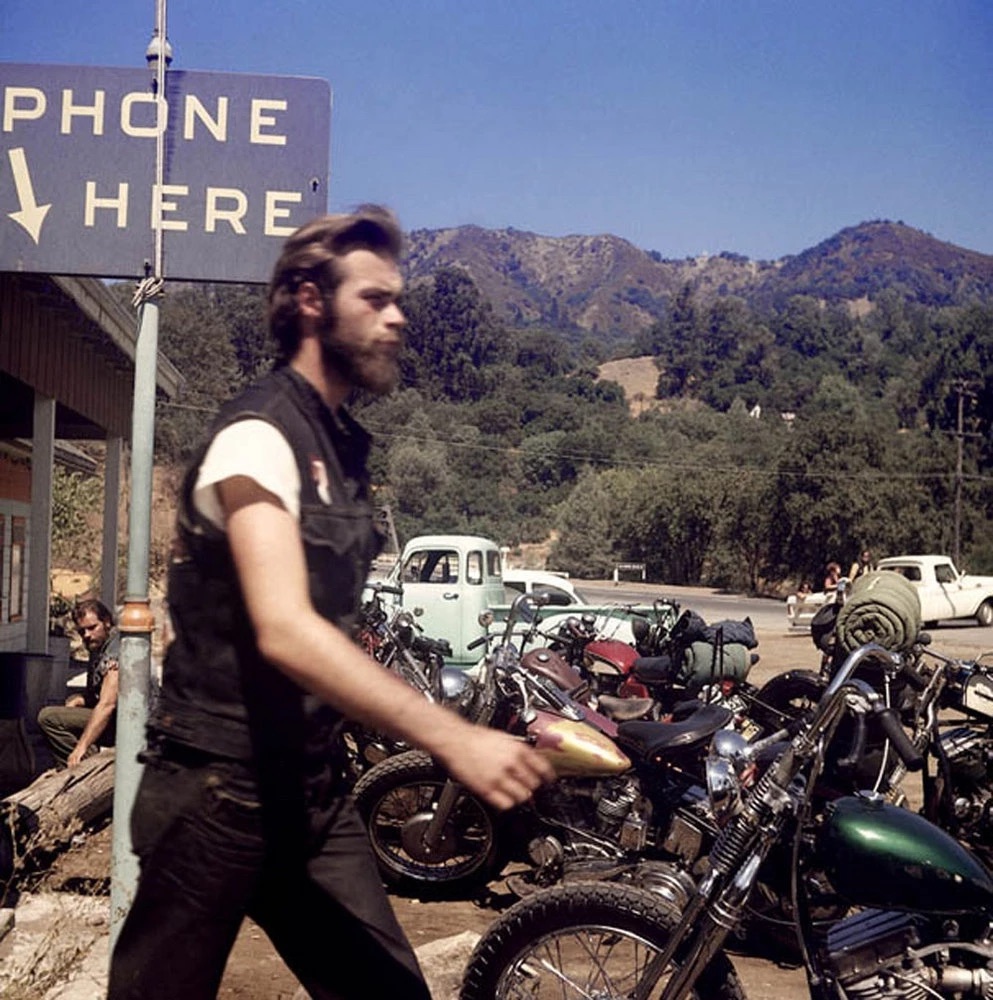
“The hard core, the outlaw elite, were the Hell’s Angels… wearing the winged death’s-head on the back of their sleeveless jackets and packing their ‘mamas’ behind them on big ‘chopped hogs.’ They rode with a fine unwashed arrogance, secure in their reputation as the rottenest motorcycle gang in the whole history of Christendom.”
– Hunter S. Thompson, Hell’s Angels 1966
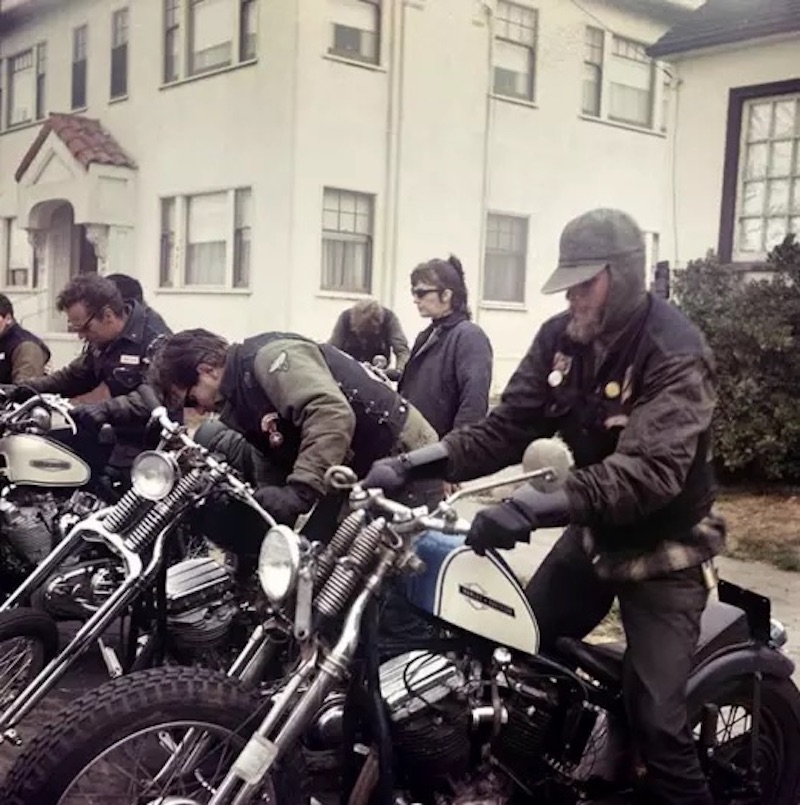
“No sympathy for the devil; keep that in mind. Buy the ticket, take the ride…and if it occasionally gets a little heavier than what you had in mind, well… maybe chalk it off to forced conscious expansion: Tune in, freak out, get beaten.”
— Hunter S. Thompson
Images an exhibition at the excellent Mbphoto, where prints are for sale.
Would you like to support Flashbak?
Please consider making a donation to our site. We don't want to rely on ads to bring you the best of visual culture. You can also support us by signing up to our Mailing List. And you can also follow us on Facebook, Instagram and Twitter. For great art and culture delivered to your door, visit our shop.










